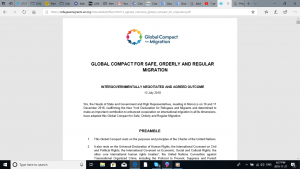

Check toolbar on right for globalism links (under counter).
Please sign this: PETITION E-1906 CLICK HERE
All personal court appearances are under “BLOG”
Challenge to UN Global Migration Compact dismissed in Calgary, however
Court rules that it is non intended as legally binding contract
Court Case
A v. Her Majesty, the Queen
Court File No: T-2089-18
Calgary Branch, Federal Court
300-635 8th Ave SW, Calgary
Filed: November 6, 2018
Ruled: February 12, 2019
The Claim was filed in Calgary Federal Court on December 6, 2018. It asked (among other things), for an injunction against signing the UN Global Migration Compact.
The Defense filed a motion to strike, claiming that under Federal Courts Act, it should have been an “Application for Judicial Review”, not a claim. However, that doesn’t seem to be the only problem.
After some back and forth, the Statement of Claim was struck out (without permission to amend), and a $500 cost award was issued against me.
Here are some quotes from the ruling. The most interesting is possibly the one where the Judge confirms that the UN Global Migration Compact is not intended as a legally-binding agreement.
So, who won? The goal of the claim was to prevent Canada from joining the UN Compact, and the Judge says that it has no legal weight anyway.
[2] (Plaintiff) pleads, in the alternative, that if Canada has already signed the UN Compact when the Court rules on her claim, the Court should void the signature and any legal consequences
In this case, the issue of whether it should have been a 1/ Statement of Claim, or 2/ Application for Judicial Review, is sort of mute, since this alternative “does” fall within the scope of a Claim.
Court is also correct that seeking to nullify any legal consequences “is” primary function of this action. However, the Judge will go on to say that the UN Global Migration Compact “doesn’t” carry legal weight.
[8] However, this does not exempt a plaintiff from pleading material facts supporting the claim. Rule 174 states that a Statement of Claim “shall contain a concise statement of the material facts on which the party relies.
Court finds that the facts plead were not specific enough to be suitable for an action.
[15] The Supreme Court has substantive content of each Charter right in the case law, and a Plaintiff who relies on the Charter must plead material facts to satisfy the criteria applicable to the provision in question. Charter cases can not be decided in a factual vacuum.
Interesting to know. General pleading are not enough in this case, and more definitive and substantive arguments must be made.
[26] As it is plain and obvious that (her) claims based on the Charter and other statutory provisions cannot succeed, the thrust of her claim is simply that Canada should be enjoined from joining the UN Compact, a non-legally binding, cooperative framework agreement because she is of the opinion that it attempts to normalise mass migration to any country, and that the public should have been consulted on this agreement.
Again, the Judge re-iterates that it is “non-legally binding”. Having rejected the specific constitutional arguments earlier, apparently the only argument left is that the public should have been consulted.
[27] It is well-established that the conduct of foreign affairs, and international relations, including the decision to conclude or withdraw from a treaty, is part of the Crown’s prerogative powers and falls exclusively under the executive branch of government. In the absence of a Charter challenge, a decision pertaining to such matters is not justifiable.
There “were” several Charter challenges listed, but the Calgary Court found them too broad to be acceptable.
[25] Based on my review of the Statement of Claim, it is plain and obvious that the Contract Claim discloses no cause of action and must be struck out. The Statement of Claim quotes lengthy exerps from the UN Compact, including the following statement at Paragraph 54 of the claim, which indicates the UN Compact is not intended as a legally binding contract:
44(7) “This Global Compact presents a non-legally binding, co-operate framework that builds on the commitments agreed upon by Member States in the New York Declaration for Refugees and Migrants. It fosters cooperation among all the relevant actors on migration, acknowledging that no one State can address migration alone, and upholds the sovereignty of States and their obligations under international law.”
This is possibly the most interesting part of the entire ruling. The Judge states that the UN Global Migration Compact is not intended as a legally binding contract.
We now have a Federal Court Judge ruling that the UN Compact is “not intended as a legally-binding contract”. This is huge, as this may thwart any attempt by open-borders advocates to use the UN Compact as a “reference point” at a later date.
Even though the Court threw the case out, the reasons given may be what we need to prevent it from becoming “soft law”.
You’re welcome, Canada
$900 — costs of travel, court fees, other fees
$500 — costs award issued by Calgary Court
PRICELESS — protecting Canada’s sovereignty
